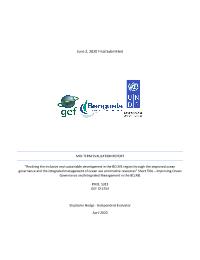
Mid Term Review of the Improving Ocean Governance and Integrated Management of the BCLME III
Output 3.4.1 Innovative nature-based and gender-responsive solutions developed, financed and applied for sustainable recovery
Goal 1. End poverty in all its forms everywhere
Goal 13. Take urgent action to combat climate change and its impacts
Goal 14. Conserve and sustainably use the oceans, seas and marine resources for sustainable development
1.5 By 2030, build the resilience of the poor and those in vulnerable situations and reduce their exposure and vulnerability to climate-related extreme events and other economic, social and environmental shocks and disasters
13.2 Integrate climate change measures into national policies, strategies and planning
14.2 By 2020, sustainably manage and protect marine and coastal ecosystems to avoid significant adverse impacts, including by strengthening their resilience, and take action for their restoration in order to achieve healthy and productive oceans
14.5 By 2020, conserve at least 10 per cent of coastal and marine areas, consistent with national and international law and based on the best available scientific information
1: Others
2: Sustainable



The Benguela Current Large Marine Ecosystem (BCLME) spans some 30 degrees of latitude, extending from AngolaÔÇÖs Cabinda Province in the north, to just east of Port Elizabeth in South Africa. It is one of the world's richest marine ecosystems and supports an abundance of life, sustaining both artisanal and large-scale fishery activities which contribute to local food security and employment for hundreds of thousands of people in areas of limited alternatives; these fisheries activities serve as important drivers of economic development. In addition to fisheries, non-living marine resources exploitation is socially and economically important with total marine goods extraction worth some US$260 billion per annum. The GEF co-funded Benguela Current Large Marine Ecosystem (BCLME) Programme, for which planning discussions commenced by the mid-1990s, ran effectively from 2002 to 2008 and promoted the integrated management and sustainable use of marine resources of the BCLME. Over the past years, BCLME project has accomplished several achievements in the three countries (Angola, Namibia and South Africa) among which the establishment of BCC and the signing of the convention can be mentioned. This proposed project is therefore initiated to build on the strong political commitment of the three countries to sustainable management of the BCLME and on the past GEF investment in the region, the proposed project aims to 1) promote further policy, legal, institutional and management reform at both regional and national level to implement SAP and Convention; 2) promote the engagement of communities as well as private sectors in stress reduction demonstration activities and in the implementation of SAP and Conventions; and 3) strengthen institutional and human capacity building through, among other means, south-south cooperation.